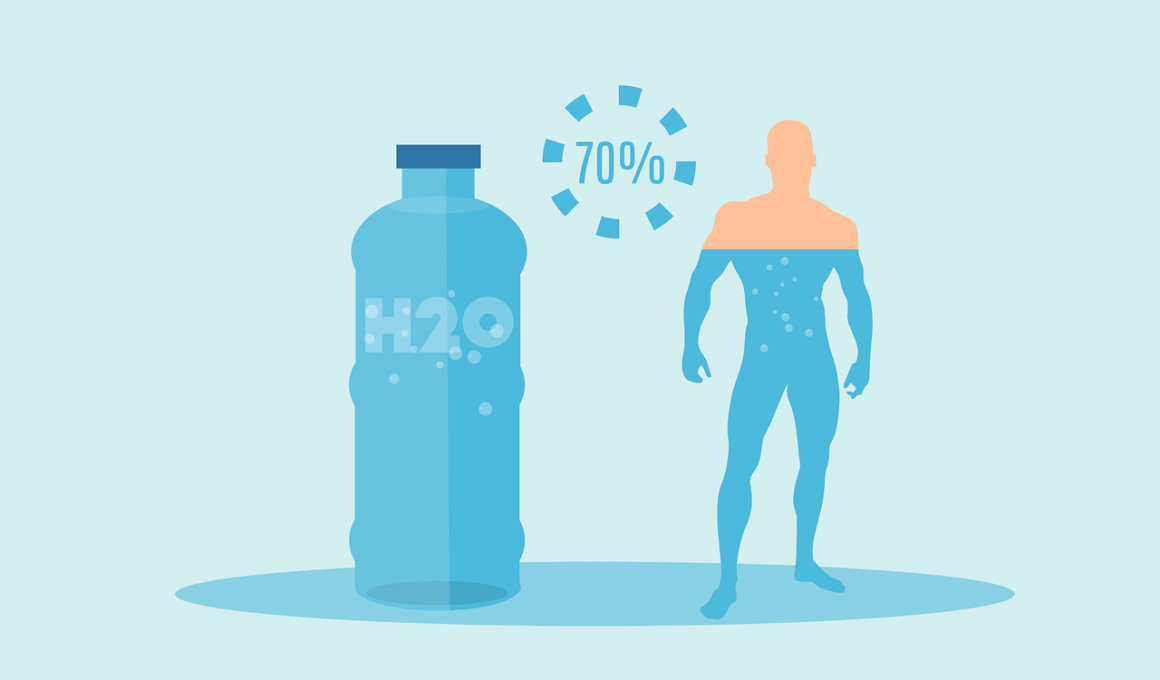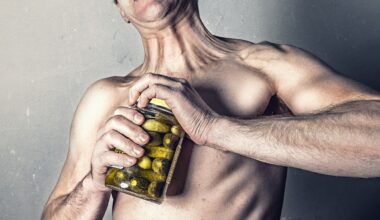Understanding the Importance of Hydration
Hydration is vital in bodybuilding, especially as competitions approach. Proper fluid intake impacts your performance, physique, and recovery. During intense training, your body loses water through sweat and respiration, increasing the need for replenishment. Signs of dehydration can severely affect your lift capacities, leaving you feeling fatigued and unable to perform at your best. Monitoring fluid intake is essential in the weeks leading up to a show. It’s crucial to establish a hydration baseline to understand your needs. Consuming enough water will not only improve your mood and focus but will also ensure your muscles are functioning optimally. Dehydration may lead to muscle cramps, decreased strength, and poor endurance. Furthermore, glycogen storage depends on adequate hydration, influencing energy levels during workouts. Assess your hydration strategy regularly to ensure compliance with your body’s signals. Pay attention to colored urine, as it can indicate hydration levels. A deep yellow hue often suggests dehydration, while light, pale yellow indicates sufficient hydration. Remember, fluid balance impacts not just your performance but can also determine your physique’s appearance on stage.
Signs of Dehydration
Recognizing the signs of dehydration is critical before a bodybuilding competition. Common indicators include dark urine, excessive thirst, fatigue, headaches, and dry mouth. Additionally, if you experience muscle cramps during workouts or if your skin lacks elasticity, often referred to as skin turgor, consider these red flags. Monitoring your body’s hydration needs starts with being aware of your physical responses. An effective way to gauge hydration levels is by consistently tracking urine color throughout the day. Aim for light yellow to ensure proper hydration. Another sign can be a sudden drop in energy levels during workouts. Feeling unusually fatigued could suggest that your hydration strategy requires adjustments. Additionally, maintaining a consistent drinking schedule can enhance your ability to stay hydrated effectively. Focus on drinking water consistently rather than consuming large amounts in one sitting; it’s often better for absorption. If you find yourself sweating excessively without adequate fluid replacement, your performance may suffer. Remember to adjust your hydration plan depending on factors such as workout intensity, weather conditions, and meal composition.
Another sign that your hydration strategy needs adjustment stems from your performance during workouts. Maintaining energy levels is critical; if you notice a lack of strength or endurance in the gym, these could be signs of inadequate hydration. Sweating is your body’s natural response to heat and it can lead to a loss of electrolytes. Electrolytes are necessary for muscle function and hydration. If you are not replenishing these losses effectively, you may struggle to perform as needed when it counts the most. A good strategy is to consume fluids containing electrolytes, especially during intense training sessions. Think about utilizing sports drinks or electrolyte tablets to restore balance, ensuring optimal performance. Remember, being properly hydrated can translate into better muscle gains and recovery rates, helping you to achieve your goals more efficiently. Don’t forget to adjust your fluid intake based on the weather and your activity levels accordingly. Keeping hydrated also boosts your mental focus, which is crucial during competitions. So, assess your hydration strategy and make necessary modifications as needed based on your body’s cues.
Changes in your appetite can also signal that something is off with your hydration strategy. A decrease in appetite may indicate dehydration, as your body prioritizes fluid balance over hunger cues. If you find yourself less motivated to eat or feeling nauseous, it’s vital to check your fluid intake. Often, your body might mistake hunger for thirst, leading to reduced food consumption when all that’s needed is hydration. Aim to drink water before meals; this not only helps manage hunger but can improve digestion. Proper hydration enhances nutrient absorption, enabling you to maximize the benefits of your bodybuilding diet. Maintaining a food diary can help track changes in appetite and correlate these with your hydration practices. Being attentive to these signs allows you to make vital adjustments before show day. Additionally, consider how your meals are impacting your hydration levels. Foods high in water content, like fruits and vegetables, should be a staple to complement your fluid intake. Poor hydration can hinder performance and muscle recovery, affecting your competition goals.
When meeting your hydration needs, be mindful of the timing and type of fluids consumed. Adjustments may be necessary based on your training schedule. For example, delaying fluid intake can lead to problems, especially before workouts. Instead of gulping water right before training, consider consuming fluids throughout the day. This technique will improve absorption and help prevent stomach discomfort during workouts. Pre-training hydration should involve consuming fluids gradually to ensure your body is prepared for exercise. Moreover, be careful with extreme diets leading up to the show; they can disrupt your hydration levels. Some competitors avoid carbohydrates, but doing so may also lead to dehydration. Carbohydrates help retain water in muscle cells, making proper hydration even more crucial during this period. Monitor your weight regularly; fluctuations may indicate hydration issues. If your weight changes rapidly, it signals the need to modify your hydration strategy. Lastly, customize your approach based on personal preference and effectiveness. Some might perform better with frequent small sips, while others prefer larger amounts less often.
Evaluating Pre-Show Water Loading Techniques
As the competition nears, many bodybuilders adopt water loading techniques. This method involves increasing water intake in the days preceding the show to enhance muscle fullness. While this technique can be effective, careful evaluation is essential. It’s important to assess how your body responds to increased water consumption. If you find yourself feeling bloated or overly full, this approach may need adjustment. A common risk of water loading is the potential for electrolyte imbalances. Monitor your body’s signals closely; if you feel sluggish or experience muscle cramps, reduce your water intake accordingly. Many bodybuilders will taper their fluid intake days leading up to on-stage appearances, aiming for that coveted “dry” look. Adjusting this strategy requires finely-tuning based on your needs. Continue assessing your urine color and energy levels during this phase. Make note of how hydration influences your appearance in the mirror as well. Consistent monitoring helps delineate the optimal balance between fullness and dryness. Strive to find what works best for your body; everyone’s response to water loading is unique.
In conclusion, managing hydration effectively before a bodybuilding competition can significantly impact your performance and physique. Regularly evaluate hydration strategies based on signs your body presents. Signs of dehydration, performance changes, appetite shifts, and timing of fluid intake all contribute to a successful hydration plan. Understanding these cues will help ensure you achieve your desired look on stage while maintaining optimal energy levels. It’s crucial to be aware of hydration practices in the weeks leading up to the competition to avoid mistakes. Always personalize your approach, noting any specific responses your body exhibits. Regularly fix your fluid intake, adjusting as necessary for training intensity and dietary changes. Remember to incorporate electrolyte-rich fluids for better muscle function and recovery. As you prepare for show day, keep your strategy adaptable while drawing from your experiences. Lastly, stay committed to understanding how hydration influences every aspect of your preparation. Take advantage of hydration monitoring as a vital tool in your bodybuilding journey. Championing your hydration strategy can set you apart on competition day.


